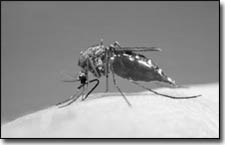|
After 34 days of swatting, dodging and
itching, my wife Rachael voiced a new concern. "I think we're
dealing with a different breed of mosquito now," she said. "I think
they've gotten smarter."
It was the summer of
2000, and Rachael and I had made the big shift, leaving our
professional jobs for a summer of commercial fishing in Alaska. We
found ourselves on Kalgin Island, an exotic chunk of rock most
Alaskans have never  heard of. The tiny island lacked electricity,
roads, currency, shops and much more than a handful of fish camps.
It boasted views of active volcanoes, a large herd of moose, dozens
of resident bald eagles and everything from fields of wild iris to
fields of blueberry bushes. Kalgin Island also enjoyed an
incredible crop of biting black flies, no-see-ums and
mosquitoes. heard of. The tiny island lacked electricity,
roads, currency, shops and much more than a handful of fish camps.
It boasted views of active volcanoes, a large herd of moose, dozens
of resident bald eagles and everything from fields of wild iris to
fields of blueberry bushes. Kalgin Island also enjoyed an
incredible crop of biting black flies, no-see-ums and
mosquitoes.
Alaskan mosquitoes are
an altogether different breed than their Colorado cousins, ranking
as the super-athletes of the species faster, bigger and holding a
greater volume of blood. Even the welts appear different, and the
itch pushes you to the edge of madness. On that 35th day, the edge
of madness was getting dangerously close.
I'd just returned from a
day of setting and hauling nets and picking salmon from the
abundant stretch of sea that fronted our cabin. I rapidly stepped
through the cabin's front door and quickly slammed it, hoping none
of our six-legged companions had snuck in, when Rachael handed me
the bad news.
"I think the bugs are
evolving," she said. "They're learning our motions."
Anywhere else, such a
statement would be rewarded with a one-way trip to the padded cell.
In Alaska, it rang true. Plus, Rachael had solid
evidence.
"I awoke to total
silence and out of the corner of my eye saw one of them drifting
toward me," she remarked. "There was no high-pitched whine. She was
just riding on an air current and not even beating her
wings."
Rachael explained that
the wings fired up only after she took a swat, allowing the bug to
easily dodge the blow. Later that morning, she had gotten further
proof.
"Another one perched
itself on the lip of my coffee cup," she said. "It waited for me to
take a sip, jumped off the edge and stung my cheek."
Once again, a statement
that should have been cause for concern drew compassion. I'd just
spent half my morning working nets near the shore. My hands busy
with rope and net, I could do nothing about the swarm that
invariably enveloped the skiff. These mosquitoes had no need for
intelligence; they had chanced upon easy prey. I pulled and coiled
that net as quickly as possible as the bugs feasted on my head and
neck, the only exposed skin on my body. Powerless to do anything, I
had to suck it up as dozens stung my face, buzzed into my ear
canals and drowned in my tear ducts.
Looking back, Alaska
stands apart as the most illustrious chapter in a fairly
interesting life of conflict with the Class Insecta. Still, I
distinctly recall being mauled by sand fleas in Honduras. I wince
when I think about a scorpion sting in Mexico. Silver dollar-sized
welts covered my body after I swam through a mass of sea lice in
Belize. And when a brown recluse snuck into my el cheapo, basement
apartment in Boulder, my left arm swelled to Sumo size and stayed
that way for three weeks.
Even after all of this
six- and eight-legged glamour, my first sting of this mosquito
season was a special one. Like many, the media frenzy won out for
me and thoughts turned to West Nile Virus. In a bizarre state of
near-Alaskan paranoia, I braced for the arrival of the illness.
Luckily, I came to my senses a few hours later.
I'm still dumping out
the kiddie pool every night, staying out of the yard at dusk and
making sure the screens are closed. But I've also made a conscious
decision to not spend my summer hiding from mosquitoes. I learned a
valuable lesson in Alaska. You can slap, hide or spray, but these
little bugs cannot be beaten. And a close look at our efforts to
defeat the bugs reveals interesting results. Mosquitoes frequently
do boast higher intellects than those of us doing the
swatting.
|